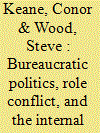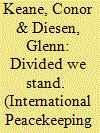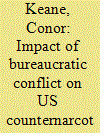|
|
|
Sort Order |
|
|
|
Items / Page
|
|
|
|
|
|
|
| Srl | Item |
| 1 |
ID:
143282


|
|
|
|
|
| Summary/Abstract |
Among the many challenges confronting the United States and its allies in Afghanistan were cohesion and communication problems in state-building programs. Merging role theory and bureaucratic politics approaches, this article argues that US Provincial Reconstruction Teams (PRTs), the composite groups charged with implementing these programs, suffered from incompatibilities between sectors of government, among which the military was dominant. US PRTs were affected by role conflict, resulting from varying and often competing organizational cultures with divergent role conceptions.
|
|
|
|
|
|
|
|
|
|
|
|
|
|
|
|
| 2 |
ID:
145154


|
|
|
|
|
| Summary/Abstract |
Assessing missile defence through the prism of offence–defence theory requires primarily an examination of legal and structural constraints on future development. New weapons technology is frequently cited as having the most critical impact on the offence–defence balance. Yet, the method for assessing the introduction of a new weapons technology tends to neglect projected maturity and instead focus excessively on the initial rudimentary capabilities. It is argued here that the North Atlantic Treaty Organisation’s (NATO’s) missile defence is set to incrementally become more advanced in terms of quality, quantity and mobility, which is supported by a strategy that is increasingly favouring offence. As the system gradually enhances the offensive advantage vis-à-vis Russia, NATO categorically rejects any legal or structural constraints on future deployments.
|
|
|
|
|
|
|
|
|
|
|
|
|
|
|
|
| 3 |
ID:
139196


|
|
|
|
|
| Summary/Abstract |
Afghanistan was the first major test for US nation-building efforts in the twenty-first century. Previous analyses have identified many of the barriers that prevented the USA from engaging in effective infrastructure development, governance, security, counter-insurgency and counter-narcotics. Drawing upon interviews with senior US officials, this article offers an alternative account of the nation-building experience that highlights problems within the US government. Building on the assertions of Graham Allison, it focuses on the behaviour of the agencies and individuals within the US bureaucracy. It is argued that a lack of effective leadership permitted bureaucratic disorder between and within the military establishment, the State Department and the United States Agency for International Development (USAID). The conflict that was precipitated by this dissonance prevented the emergence of a cohesive nation-building strategy.
|
|
|
|
|
|
|
|
|
|
|
|
|
|
|
|
| 4 |
ID:
146341


|
|
|
|
|
| Summary/Abstract |
Despite counternarcotics efforts over the past decade, Afghanistan’s drug trade continues to thrive. This article is a review of US counternarcotics policy in Afghanistan, focusing on the inner workings of the bureaucratic machine. During the Bush Administration’s two terms in office, unique agency cultures ensured that no common conception or understanding of the drug problem manifested within the US foreign policy bureaucracy. Various US agencies and officials pursued separate eradication and interdiction policies, and there was similar disagreement in respect to the Alternative Livelihood Program. Consequently, the United States failed to pursue a counternarcotics program that was united, effective, or reflective of Afghanistan’s needs.
|
|
|
|
|
|
|
|
|
|
|
|
|
|
|
|
|
|
|
|
|